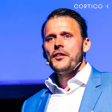Introduction to Aquas Cortico X
00:00:00
Speaker
Aquas Cortico X is an experience-led transformation business that partners with clients and technology companies to drive digital acceleration. We are experience activists, passionate about elevating everyday human experiences through the belief that what's best for people is what's best for an organization. Reach out to us for a chat. A link is in the show notes.
Introduction to 'Speaking from Experience'
00:00:35
Speaker
Hello and welcome to Speaking from Experience from Aquas Cótico X, where we speak to the people with experience of experience. I'm Will Kingston. Imagine you were the boss of a regional bank in the United States in the 1960s. You had a powerful point of difference over the national banks. If a customer walked into one of your branches, there's a good chance the branch manager would know their name. He or she would know their family. Heck, they'd probably have a barbecue together on Sundays.
The evolution of customer relationships in banking
00:01:05
Speaker
Now imagine you are the boss of that same regional bank in 2024. You've lost that point of difference as the branch networks have shrunk and you don't have the same capital to compete in digital banking with the big boys.
00:01:19
Speaker
But the big banks aren't exactly sitting pretty either. They are struggling with historically low customer trust, higher regulatory complexity, and a fragmented financial services landscape that is seeing new entrants like retailers and fintechs compete for their slice of the pie. Now imagine you're one of those fintechs. Sure, you may have an innovative proposition, but scale still matters in banking and you don't have it.
00:01:46
Speaker
What does that mean? Well, in short, it's never been more difficult to be a financial services professional. There's never been more competition. The customer journey is more complex than ever, but perhaps, just perhaps.
00:02:01
Speaker
There are opportunities out there if you know where to look. To help me shine a spotlight on where to find them, I am delighted to be joined by the head of ACWIS, CordocoX's financial services practice, Anson Vuong.
Convergence of personalization and digital convenience
00:02:15
Speaker
Anson, welcome to Speaking from Experience. Hi, Will. Thanks for having me. It's great to have you on. Would you agree with that assessment? What's your take on the state of financial services in the US in 2024?
00:02:28
Speaker
Well, I think it's an interesting time. I feel like we're at the precipice of something truly amazing within financial services, kind of going along the line of what you were talking about to kind of understand where we are today. Let's kind of take a step back to where we've been, right? You've talked about in the 60s and even before that the proposition of a bank being a community institution where an individual banker not only had high
00:02:54
Speaker
financial literacy but also high relationship intimacy provide if i dare call it hyper personalized service at that period of time now fast forward essentially have large. National banks and super regional banks who offer me essentially a really good digital experience with high convenience but the trade off is this idea of personal service.
00:03:18
Speaker
Counter that, you also have the smaller community banks and credit unions who offer great personal service but don't necessarily offer the same level of digital solutions and convenience. And so from an experience lens of a customer, you actually have a binary choice where you either trade for convenience and digital features or you trade for personal service. Today, I think with the emergence of big data, machine learning,
00:03:42
Speaker
AI and emerging technologies were at the precipice of something where you could not, you could have it all, right? Essentially what I call it, you could have hyper personalization at scale. And so you see this convergence of a value proposition where customers no longer need to make a choice. And I believe today those banks and credit unions who are able to move faster towards that vision will have not only
00:04:06
Speaker
residents with their customers but a real competitive differentiation in the market just given how homogenous it is overall. I really like that relationship intimacy i can understand in my mind how you can build relationship intimacy with a face-to-face relationship with a customer that goes into a branch regularly you're a big bank today how do you go about building that same comparable relationship intimacy with a customer in a digital first world.
Importance of understanding customer needs
00:04:34
Speaker
Well, I think it starts first with understanding what is relationship intimacy in the first place, right? I think a lot of institutions with all the buzz around AI have gone to the howl very quickly, right? And haven't defined the why.
00:04:50
Speaker
or what I would call the underlying thoughts, beliefs, and assumptions that would drive personalization in the first place. And so what I mean by that is that if we don't get that premise correctly as a leader, the more we lead on emerging technology does not necessarily mean things get better. It gets worse, right? And so the question here is going to be, what does personalization or hyper-personalization even mean from a customer's point of view? My perspective on this, and I did a lot of this work in my past with Gallup, where we studied
00:05:19
Speaker
What is the most transformative experience or feeling that a customer can have in financial services and what this idea that we came up with is essentially when a bank or credit union.
00:05:32
Speaker
can help their customer feel like they look out for their financial well-being. It is the most transformative property out there in financial services. And what the data would show is that if I as a customer agree or strongly agree that my bank or credit union looks out for my financial well-being, I'm like 73% engaged, which would put them in the 92nd percentile in the database at Gallup. They don't agree, only 20% would agree, and they're in like the bottom 10
00:06:01
Speaker
percentile in that database. And so that 50 plus point differential is not just interesting, it's the feeling that if we can use this concept of financial being as the transformative property to get them from current state to future state around personalization, that really is the biggest difference as part of that. Now, will the big
00:06:22
Speaker
Caveat there is what is financial well-being, right? A lot of folks mix financial well-being with financial health and they're two fundamentally different things, right? Financial health is about your money. It's about your financial facts. Financial well-being is your emotional relationship with money. It's your feelings with that money. So think of financial health typically, as you would imagine, right? We'll like spending, borrowing, and saving. But think of financial well-being more around reducing worry.
00:06:49
Speaker
increasing confidence, achieving enjoyment. And so if you take a simple proposition like fees, for example, right, well, no one likes fees, that's an experiential deterrent. From a financial health perspective, you might say, hey, fees takes money out of my pocket from our customer's pocket, and thereby hyper-personalization would be, hey, let me help them try to avoid fees by giving them information and knowledge of how to do that in the future.
00:07:17
Speaker
A financial well-being view would be, no, no, no, taking money out of my pocket as a customer not just takes money out of my world, it also increases worry in my world and thereby hyper-personalization is helping the customer anticipate that a fee could happen and proactively alerting them to help fix it before that happens in the first place.
00:07:36
Speaker
And that simple difference, I think, is the difference between how you can resonate in a digital format that doesn't require a human being doing and doing it at scale versus requiring folks to come into a branch or call the contact center.
Balancing personalization and privacy
00:07:50
Speaker
A couple of interesting strands there. I really like where you started that answer by saying that you need to understand the why behind the use of emerging technologies. And we discussed this in a previous episode with Rick Repi and Anand Balasubramanian on the use of AI. A lot of emerging technologies are
00:08:07
Speaker
a hammer in search of a nail until you get to that Y, so it's a really good insight. I want to dig down on financial wellbeing further because I imagine financial wellbeing means very different things to very different people, a family looking to save for their first home. You could be a multimillionaire who wants to buy a yacht. You could be a young student who wants to get through university.
00:08:29
Speaker
That's premised on customer understanding to be able to then service those different needs. How do banks get to a place where they can have that customer understanding to know what financial well-being means to different people and then address those different needs? Well, first, I think when I think about hyper-personalization, Will, I think about this concept of being where we can offer strikingly similar products and offerings.
00:08:55
Speaker
but make it feel remarkably different, right? And that's what we're trying to achieve through this process here. The question is, for most banks and credit unions, the reality is, I should say, is that you really have a very limited picture of their financial world, right? You are just one institution amongst an ecosystem of institutions that they work with. And so for you to be able to truly navigate them across their financial wellbeing journey is really difficult.
00:09:23
Speaker
but the first part of this i think will's number i think it's in two pieces one is we've got to stop
00:09:29
Speaker
asking and start listening. What I mean by that is today, most customer experience programs require a survey to ask a customer what they want and need, and then we respond proactively. The efficacy of that type of work is really low, as you would imagine. Assume someone takes a survey and assume they would express the needs that they want, and then assumes that you'll take some action on it in a personalized way. But you have a bunch of behavioral data today within a bank, more data than most industries, where you can start to track behaviors
00:09:59
Speaker
for them, right? And so, for example, instead of asking a customer if they had a problem and then trying to call them back to help resolve it, couldn't we determine a signal within the data today to say, hey, I believe you will incur a problem. We'll already have a problem before a survey is even administered and being able to proactively create outreach as part of that.
00:10:20
Speaker
The other part of the equation will, I think, is to be able to ingest third-party data as well, right? And so we've got to be able to say, look, we've got to look outside our data today and start to mix in other data as part of that. I think of a financial institution that we work with where they ingest, for example, real estate data. And what they're trying to see here is say, look, once I know that my customer is not going through a mortgage process,
00:10:48
Speaker
they're going through a home buying process. That's the job to be done. That's the person behind the customer. And so if I get that data today around real estate and where they're looking in terms of spots where they can look for houses and prices and things like that, I know if I can ingest that type of data, I can give them something proactively
00:11:08
Speaker
faster than other banks or credit unions to be able to give them an offering or an offering to say, hey, like straight through processing and say, hey, look, we've already approved you, for example, for this specific loan of this size versus them having to ask you later on by calling the contact center or a loan agent as a whole.
00:11:25
Speaker
And so I think part of this is diversify the data set and the view of your, of the customer as a whole. But that again goes back to the financial wellbeing concept, right? Will, that you're seeing this customer beyond them with you versus them in their holistic picture of their financial wellbeing.
00:11:41
Speaker
as an experienced strategist. To me, that sounds super cool. Very exciting. I can envisage a different response though. Joe blogs on the street saying, oh, that's a bit scary. Finding my data, seeing what I'm doing with real estate agents, seeing my behaviors. I don't feel comfortable with this. How do banks balance that need to provide personalization with the potential worries from some quarters that there may be intrusions on privacy or there may be
00:12:11
Speaker
concerns around data security what i think you could give customer the choice to share data the second piece i would say is you better show the efficacy of that choice right meeting that if i'm giving you data and then you give me offerings and information that are not pertinent to me within a format that i don't like within a time period that does not work for me that doesn't net of course i would not want to
00:12:35
Speaker
share my data right there's a trade-off between what i give you and what i should receive back from a value standpoint but the data would show will that most people on average are willing to share their data for trading for a more personalized experience.
00:12:51
Speaker
The assumption there, of course, is that they actually get that personalized experience. It really behooves, again, banks and credit unions to get it right in terms of the types of things they're offering and when and how they're doing it, and be able to mix the ways and modalities in which they're doing it to improve residence. That's a really insightful point that that trade-off is fine for most customers as long as you are delivering value for them.
Can legacy institutions innovate at scale?
00:13:19
Speaker
big piece of that puzzle in terms of how you go about delivering value is innovation and how you go about innovating to deliver higher value products and services. Let's go to innovation. This is a topic close to my heart. I used to be the head of customer experience for a very old, very conservative merchant bank, and I often ask myself,
00:13:39
Speaker
The almost philosophical question, is it really even possible for old legacy financial services institutions to innovate at scale or is that just something that you have to leave to the sexy fintechs? So I'll pose the question to you. Is it possible for the biggest, the oldest financial services institutions to really innovate and to innovate at scale?
00:14:00
Speaker
It's definitely possible, but it's hard. Right. And so, and it's been done, I should say as well. Right. The reality is, is if you look at the data around personalization and who, which banks do it better versus not, there's a, of course, a huge latency towards those banks that have, are very digital, have started digital or have moved their business model to be completely digital. Right.
00:14:24
Speaker
That makes a lot of sense, right? You're appealing to a younger generation, you're putting things in a digital format, and your business model speaks to that. But to your point, Will, there are a bunch of traditional brick and mortar institutions are now trying to become digital, and the allocation of budget is really tough from what I've worked with banks around these pieces, right? You're managing several assets to
00:14:46
Speaker
technological assets, human assets, and physical assets all at the same time, which spreads costs around those pieces. But I actually think it's less about money, in my perspective, will than it is focus. Where banks do it the best is that they've deployed groups that are highly focused on just
00:15:06
Speaker
innovation as an example i'll give you an example with capital one example capital one if you look at the benchmarking data today needs every category around the spot around personalization and service and nps and customer satisfaction as a whole right what they've done for example is build a concept of a lap.
00:15:23
Speaker
Right the lab is a place where folks are only looking futuristic leave for the things that they are looking to do and out of that lab becomes concept in which they can think about taking action towards the customer in a beneficial fashion as an example.
00:15:40
Speaker
One of the projects that came out of that lab, for example, is helping moments that matter as an example, right? Moments that matter is a project where Capital One was looking for anomalies in credit cards spent and was able to flag to a customer if there was anomaly in half them proactively to outreach to them and resolve those pieces. Something super simple as kind of a test and learn piece.
00:16:02
Speaker
That would never kind of come out of a BAU type business today, right? That they're too focused on what they're focused on today. And part of the time is giving folks time and attention to do this as a whole. The other part of this will is that they're also just willing to experiment as well, right? The willingness to go test and learn has to be there as well. So you can innovate all you want, come up with the most amazing ideas. But at the end of the day, if you're not willing to take that out to the market and see how that works, it doesn't really matter. And so what I don't think what Capital One did was
00:16:32
Speaker
in the world of personalization is the most amazing thing but they were able to test the efficacy of that type of work and be able to say hey it did work it did drive customer satisfaction and we can start to work on other things as a proof of concept and showing to the organization the whole that it did work and that the investment is worth it.
00:16:49
Speaker
A little nugget of gold in that answer, which was if you don't take it out to the market, it doesn't matter. So I just heard, I think, a really clear and strong articulation of the benefits of an innovation lab. You do have strategic focus around innovation. One of the potential problems of setting up an innovation function like that is that you have the kids off playing in the corner with cool toys.
00:17:12
Speaker
but then they struggle to get by and for the rest of the business around the innovative stuff that they're doing and so the idea is don't go anywhere to your point they don't make it out to market. If you're sitting in one of those innovation teams in a financial services business, how do you make sure that the cool ideas that you're building out actually go and get adopted by the business and ultimately end up in the market?
Integrating innovation within organizations
00:17:32
Speaker
Yeah, I would give them three big pieces of advice, Will. Number one, first spend the time
00:17:38
Speaker
building the foundational knowledge of the organization of what you're doing in the first place. What I mean by that is you have to as an organization, from a change perspective, have to be able to establish a common language and understanding in the first place to even have a thoughtful dialogue around it. And what I mean by that, Will, is that a lot of folks are infatuated with the concept of AI and personalization, but actually don't know what it really means today or have a limited view of what
00:18:03
Speaker
that is. So you could say AI, for example, is chat GPT or generative AI and not know that there are other types of AIs that could be involved and combined to create the end solution as an example. You may say personalization means something to someone. Well, that might mean something to you. It might be something different to me. I'm reminded of a story of a client who went to a team and said, hey, they wanted to provide more
00:18:28
Speaker
frequent communication to their clients on a monthly basis. And the person said, oh, that's great. What are you doing? And said, well, we're making it really personalized. We're putting their first name in the emails that we send out monthly. And so instead of that person saying, well, that's not personalization, you have to say, well, there's levels to this. There's a maturation. And this is where this is versus where we need to take this going forward. And so there's a baseline and common understanding associated with that.
00:18:54
Speaker
What you have that will i really think you've got to be able to focus on the experience you want to generate on the back end of things right so like i mentioned before a lot of these basic credit unions move to the house very quickly but have very what i call functional use cases.
00:19:10
Speaker
In banking, those are commonly things like I want to do a chatbot as an example, or I want to do some type of employee productivity as an example. But they really haven't defined from an experience standpoint what they actually want to deliver and innovate on in the first place, right?
00:19:27
Speaker
a fan of moving away from these use cases into what we would consider user stories, where we're actually writing out what the emotional feeling is for that end customer and what that would mean to them. For example, a user story could be, I want to increase digital success by giving them real-time information and support when they occur a problem. Or, hey, I want to sequence the right resources, support, and advice
00:19:54
Speaker
when someone is buying a home, or I want to help a customer understand whether or not they're on track with their budget goals or financial aspirations, as an example, and then say, okay, what would have to be true from a capability standpoint to do that? What I find real is a lot of these innovation teams to get that innovation done, take a bottoms up approach and try to boil the ocean, which takes a long time, a lot of steering and a lot of alignment, especially for a large bank versus starting with some
00:20:23
Speaker
clear propositions and user stories that can actually drive efficacy pretty quickly. And my fear piece is kind of steal this from one of my colleagues is essentially, you know, starts them on scale fast, right? Kind of what we talked about before around just making sure you can test and learn and get something out of the market and get feedback quickly related to those.
00:20:41
Speaker
pieces. And why? Because you need to be able at some point show value back to the organization versus you've been in a lab in a dark room all day not coming up with crazy good ideas but showing no proof of concept out in the market.
00:20:55
Speaker
I want to hone in on that second tip there. And what I find interesting is that it goes to show that innovation is as much about cultural change as it is about technology change. Now, what you said is you need to get people thinking about the end experience. You need to get people thinking, well, how do we deliver that experience for customers? That often is in the context of
00:21:18
Speaker
say Barclays or say Chase, where you'll have a lot of 30 or 40 year veterans who will hear this customer experience stuff and they'll go, this is warm and fluffy nonsense.
Cultural change for customer-centric innovation
00:21:28
Speaker
Let's just focus on the bottom line. Let's focus on margins. Let's focus on doing the basics right. And so there's a hearts and minds thing here. There's how do we go about changing the way that people think and changing the culture in terms of how you go about building that customer centric mindset in those types of institutions.
00:21:46
Speaker
What are some things for people to keep in mind as they go on that journey? Before I answer that question, let me talk a little bit about the thought around experience and business outcomes that you've spoke of. Most of the expressioners, especially in banking, have sought after this golden goose to try to prove how experience actually drives ROI on the back end of it. And they use a lot of fuzzy math to create that piece, and it's not as direct as part of that.
00:22:15
Speaker
I would say our conversation around hyper-personalization is interesting in banking in this way. Well, in that, to me, hyper-personalization represents one of the biggest monetization potential events in banking for a very long time. Experience and monetization have never been more interlinked through the lens of hyper-personalization. What do I mean by that? Banking is an interesting category.
00:22:41
Speaker
Executives, when you ask them about experience, they would say experience sounds like warm, caring and friendly. They've taken a model out of hospitality and retail and applied it into banking.
00:22:55
Speaker
And the problem with that is that is not the expectation customers have in this specific category, right? The other problem is that it doesn't directly tie as well to monetization, right? Give you an example, right? Well, if I go to a branch and they're warm, caring, friendly, and I have the most amazing experience possible, they give me coffee, they give me a seat and they welcome me and they walk me out the door and say, wow, I love this place. And then tomorrow I want to buy a home and get a mortgage. I don't necessarily go back to that bank.
00:23:25
Speaker
per se, right? It's not a direct monetization there, right? It goes back to that hyper personalization concept is that I'm gonna have to anticipate somehow that I'm going through a home buying process and get my product services offering to them faster and earlier and more in a resonant way than my competitors to get that done. So that's kind of that first piece. In terms of talking about change, I really think we need to move our mindset as leaders from this concept of change management to change leadership.
00:23:52
Speaker
Change management is a functional view of change. It says, I've already decided to roll something out and thereby these are the operational things I need to do and socialization things I need to do to get people on board. Change leadership means that no, no, no, I'm going to bring folks along with me along this ride and have them be part and provide input into this process. And so no one likes to be changed.
00:24:18
Speaker
But the people love change. Right. And so this kind of helps you think about the precipice and saying, look, we're going to be able to.
00:24:26
Speaker
help align and energize leaders faster and quicker if we put that work up front versus once we've rolled things out on the back end of it. And so I think a lot of the best practices here is really helping socialize these concepts early, bringing those leaders that are more stodgy and more stuck in their ways earlier in the process, providing input and mitigating their concerns and showing proof of concept to them quickly through that test and learn environment for them to buy in.
00:24:54
Speaker
and working through an iterative process versus saying, hey, I've decided on something, I rolled it out and now I'm going to communicate that to you as a whole. There were a few cracking quotes in there. I think we've got our social media teasers sorted for this episode. You mentioned at one point going into the branch, getting a coffee. Do branches have a future in a digital first world?
Future role of bank branches in a digital world
00:25:17
Speaker
God, I just love this question, right? Like we've asked this question in financial services for several decades now and every year it's supposed to die and then some folks are opening branches, some continue to consolidate and mix back. Here's what's interesting about this. Let's look at the younger, let's call it under 40 generation banks and credit unions future customers. There's this idea that they just want to do things digitally. And what the data would suggest is yes, that's true, but not
00:25:47
Speaker
absolutely tells you the full picture of that. What I mean by that is that, yes, they have very little tolerance because of all the other digital experiences they're having for poor digital experiences in their mobile and online applications as a whole. So consider that foundational table stakes associated to those pieces. But they want to be digital first, but they want to be digital first mostly within their routine transactions, will write like everyday banking type things. Please do not tell me that I need to go into the branch to open an account.
00:26:17
Speaker
Please do not tell me that I have to go into the branch to verify something to transfer money as an example, right? Those are the things that really annoy that younger population. However, and again, this is what's interesting about banking is that there are routine transactions on one end of the spectrum and then really complex advisory conversations on the other spectrum. And when we start to get into these high-stake moments,
00:26:42
Speaker
that younger population still likes to have a human connection conversation around those pieces and that's really where I see the purpose of the branch going forward as part of that as a place to really drive
00:26:56
Speaker
high-state complex financial well-being type conversations that are not well-suited necessarily as intimate in a digital environment. And so again, will that be forever? Maybe, maybe not. But in the very medium to long run, I really believe that a branch will continue to be a really important asset. But what that asset is there to do will be fundamentally changed in terms of what that means. The implication to that will is essentially this, is that
00:27:26
Speaker
as the older generation ages and the younger generation starts to move in as the populous customer for banks, as a branch, you'll have what I call less at bats. So your batting average better be damn good, right? And so when you think about the upskilling and the needs of those individuals in the branch to have these conversations,
00:27:49
Speaker
It still goes back to the hyper-personalization will because of what type of data and information are we giving them to have a more constructive, future-oriented conversation around their financial well-being journey versus them needing to always go back and forth with kind of that typical needs-based assessment.
00:28:05
Speaker
or our British listeners, and I know there are a few out there. Less at bats would be less innings, but more runs every time you go out to bat. Final topic I want to touch on Anson, because I know it is one that is very close to your heart, is the concept of purpose in financial services.
Purpose and authenticity in financial services post-2008
00:28:21
Speaker
We had a relatively large crisis in 2008 in financial services and I feel like that the financial institutions had an identity crisis or had a result of that and they tried to basically say, we're going to save the world after that event. They really responded very strongly. Some of them were successful.
00:28:41
Speaker
Some you could argue potentially came across as a tad disingenuous. This is still a really hot topic. How do you think about the notion of purpose in financial services and how do you go about living that purpose as a bank in a really authentic way? Yeah, it's interesting. You know, there's a content written by an author named Joseph Pines and he talked about kind of the evolution of brands. Right. And he talked about how it started in a growing economy where experience was essentially
00:29:11
Speaker
an agreement between the trades, right? Well, you wanted a banana and I wanted an apple and we'd make some trades associated with that. And so then we moved to like a service economy, right? With the Industrial Revolution, essentially availability was great service, right? Like that I could get that product with high quality when I wanted it. Now that's table stakes. Then we went to this service economy and said, okay, I want that product, but you put a smile on your face and make sure it's warm, caring and friendly. Now that's table stakes. Like you go to a retail store, you get greeter, you heard them think about it.
00:29:40
Speaker
But if they don't give you a greeting, you do think about it. And then we've moved to an experienced economist and said, okay, don't only sell me the Protestant services, give me something memorable for you to remember about. I actually think now we're at the next stage of this is what I would call like the social economy. In today's world of radical transparency in the court of public opinion,
00:30:01
Speaker
what you do and how you do it really matters right and so i like to use the saying essentially as a bank the old view was you have to do you have to do good to do well you have to do well to do good now today you have to do good to do well right and so the concept there is essentially that we have to be focused.
00:30:21
Speaker
on the human being and their needs more than ever before to drive that resonance as part of that. And that's the challenge, I think, for a lot of organization wills. If you think about a traditional metric like NPS, right, it's essentially a non-social economic view of things, right? It's saying, will you recommend me
00:30:41
Speaker
to your families and friends. It's not do I look out for your financial being, right? Do I help you serve your needs better as a human being overall? And like I talked about beforehand, meeting that need is the transformation of property. And so I believe hyper-personalization or personalization is really actually a social concept around helping, especially in banking,
00:31:03
Speaker
a customer in real time through their financial well-being journey as a whole, and I think it's more important than ever. The other thing Willa mentioned to this is although trust in banking and institutions is low,
00:31:16
Speaker
That's different than how they feel about their local bank or credit union, if that makes sense. So if I ask you, Will, do you trust banks? You may say, No. If I do you trust your primary bank, you say, Yes, I do. Right? And why? Because that local experience matters. So it doesn't really, I always say, what happens globally is one thing, but you experience things locally.
00:31:37
Speaker
and averages don't exist and experience you experience your own moment of truth and that moment of truth has now become so micro in the vision of how we can think about that through the technologies and data that we have today.
Preview of future content on financial well-being
00:31:50
Speaker
I couldn't afford to pay you an appearance fee so i said that in absence of that i would let you plug some of the thought leadership you have coming out soon i need got some interesting stuff on the way what have you been doing that space and what can we look forward to.
00:32:04
Speaker
Yeah, I'm really excited about some of the thought, leadership, and perspectives that we're having. We're going to release an article shortly around this concept of financial well-being. We're going to be launching a concept around the horizons of maturity around hyper-personalization. And then we're also working, I think, a really mission-driven series around human interest stories around financial well-being. What we're doing is interviewing everyday folks from different walks of life to help
00:32:32
Speaker
and have them talk about how they think about money, their emotional relationship with money, and how that's been shaped over time. I think this will give, I hope, leaders a really good deep perspective of the variation of how that looks. And again, the opportunity of where we are based on the precipice of the opportunity we are sitting on today.
00:32:51
Speaker
We will include a link to the Aquas Cortex LinkedIn page where you will be able to see all of that good stuff as it goes out to market. Anton, this has been an absolute pleasure. If anyone wants to reach out to you, your contact details are in the show notes. Thank you very much for coming on, speaking from experience. Thanks.
00:33:11
Speaker
Thank you very much for listening to this episode of Speaking from Experience. If you enjoyed the show, please leave us a rating and a review. And if you really enjoyed the show, reach out to us for a chat. A link is in the show notes.




















